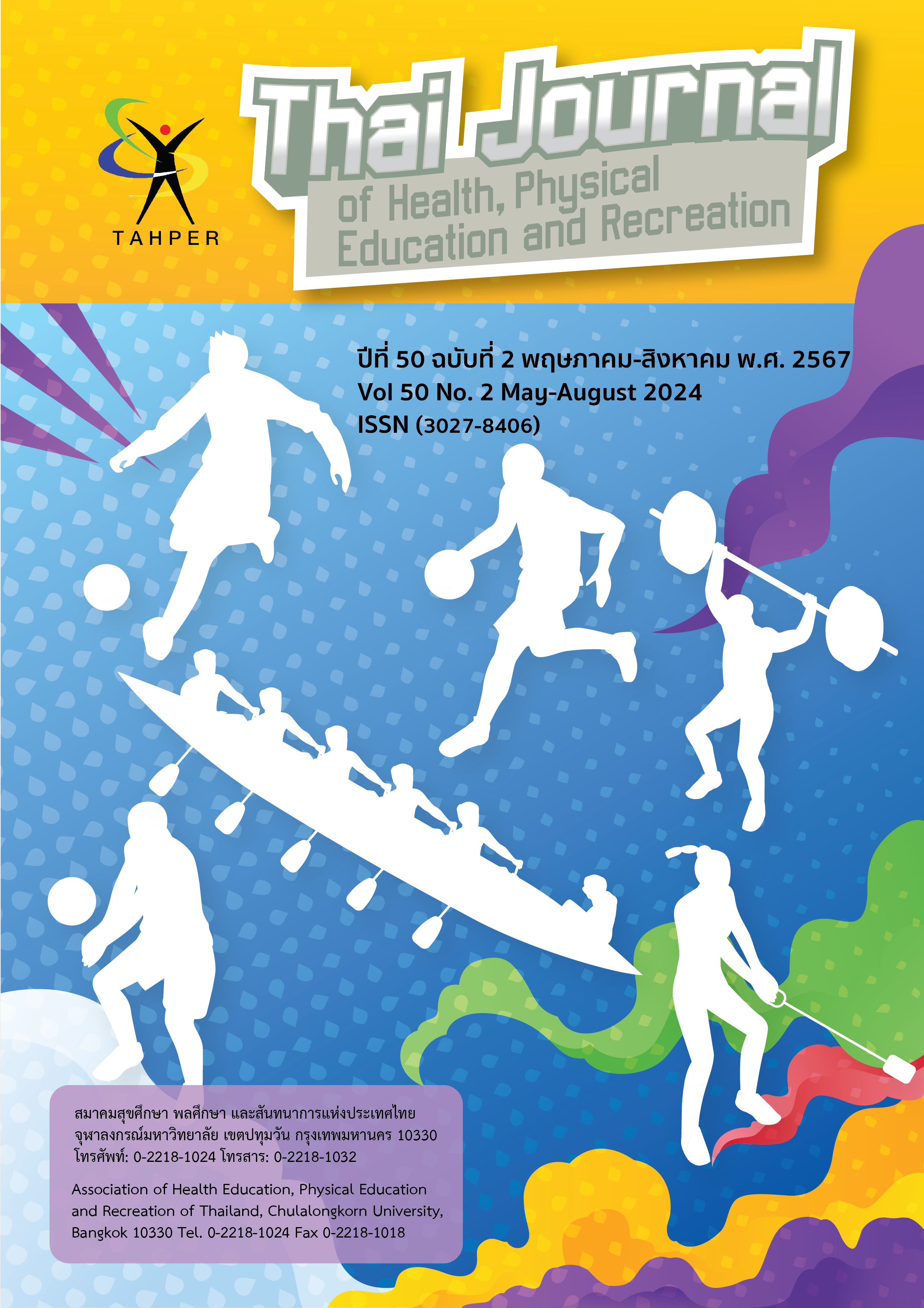Effect of Fair Play Instruction in Elementary School Physical Education Multiclass through the Thai Folk Play Activity Lessons
Main Article Content
Abstract
The purpose of this study was to examine the effect of Fair Play Instruction on elementary school physical education multiclass during the Thai Folk Play activity lessons. Participants included twenty-three 4th-6th grade students (8-12 years of age). The Fair Play instruction consisted of two 50 minute lessons per week for eight weeks (16 lessons total). Participants were observed and VDO recorded for 50 minutes in game situations before and after intervention. Students completed
a Fair Play self-evaluation form and 3 physical education professional observers completed Fair Play evaluation form by watching the VDO recorded. The study shows that the Fair Play Instruction was effective in increasing students’ Fair Play behaviors in sportsmanship, teamwork, respect for teammates, respect for others, following the rules, and non-cheating components. Furthermore, research results from students and PE professionals’ observations were consistent.
Article Details

This work is licensed under a Creative Commons Attribution-NonCommercial-NoDerivatives 4.0 International License.
Critical thinking in journals is the right of the author. The Association of Health Education, Physical Education and Recreation of Thailand is not always required, to create diversity in ideas and creativity.
ความคิด ข้อวิพากษ์ในวารสารเป้นสิทธิของผู้เขียน สมาคมสุขศึกษา พลศึกษา และสันทนาการแห่งประเทศไทยไม่จำเป็นต้องเห็นชอบด้วยเสมอไป เพื่อให้เกิดความหลากหลายในความคิดและความสร้างสรรค์
References
กรมพลศึกษา. (2557). การละเล่นพื้นบ้านไทย. กรุงเทพฯ: โรงพิมพ์ เอส.ออฟเซ็ทกราฟฟิคดีไซน์.
กระทรวงศึกษาธิการ. (2542). พระราชบัญญัติการศึกษาแห่งชาติ พ.ศ. 2542 แก้ไขเพิ่มเติม (ฉบับที่ 2) พ.ศ. 2545 และ (ฉบับที่ 3) พ.ศ. 2553. สืบค้นเมื่อ 10 พฤศจิกายน 2563, สืบค้นจาก https://www.moe.go.th
____________. (2552). หลักสูตรแกนกลางการศึกษาขั้นพื้นฐาน พุทธศักราช 2551. กรุงเทพฯ: โรงพิมพ์ชุมชน สหกรณ์การเกษตรแห่งประเทศไทย จำกัด.
จักรี อย่างเสียสัตย์. (2557). ผลของการจัดโปรแกรมส่งเสริมสุขภาพโดยใช้เกมการละเล่นพื้นบ้านไทยเพื่อลดพฤติกรรมก้าวร้าวของนักเรียนประถมศึกษา. วารสารอิเล็กทรอนิกส์ทางการศึกษา, 9(2), 16-30.
ชัชชัย โกมารทัต. (2554). กีฬาพื้นเมืองไทยภาคกลาง (พิมพ์ครั้งที่ 2). กรุงเทพฯ: บริษัทเยลโล่การพิมพ์ (1988) จำกัด.
โชคชัย ดวงแก้ว. (2558). การสร้างแบบวัดคุณลักษณะอันพึงประสงค์ในการเรียนวิชาพลศึกษาสำหรับนักเรียนระดับชั้นมัธยมศึกษาตอนต้นโรงเรียนสาธิตแห่งมหาวิทยาลัยเกษตรศาสตร์ วิทยาเขตกำแพงแสน ศูนย์วิจัยและพัฒนาการศึกษา. วารสารสุขศึกษา พลศึกษา และนันทนาการ, 42(1), 113-114.
บุญชม ศรีสะอาด. (2554). การวิจัยเบื้องต้น (พิมพ์ครั้งที่ 9). กรุงเทพมหานคร: สุรีวิยาสาส์น.
โพสทูเดย์. (2561). น่าห่วง!เด็กไทยรังแกกันในโรงเรียนติดอันดับ 2 ของโลก. สืบค้นเมื่อ 3 กุมภาพันธ์ 2561, สืบค้นจาก https://www.posttoday.com/social/general/537895
วรศักดิ์ เพียรชอบ. (2561). รวมบทความเกี่ยวกับปรัชญา หลักการ วิธีสอน และการวัดเพื่อประเมินผลทางการพลศึกษา (พิมพ์ครั้งที่ 2). กรุงเทพฯ: สำนักพิมพ์แห่งจุฬาลงกรณ์มหาวิทยาลัย
วาสนา คุณาอภิสิทธิ์. (2539). การสอนพลศึกษา. กรุงเทพฯ: บริษัทพิมพ์ดี จำกัด.
อมรา กล่ำเจริญ. (2553). เพลงและการละเล่นพื้นบ้าน. กรุงเทพฯ: โอ.เอส. พริ้นติ้ง เฮาส์.
Johnson, L.V. (2005). Fair play unit for elementary school :Getting the whole school involved. Teaching Elementary Physical Education, 16(3), 16-19.
Johnson, L.V. (2005). Fair play unit for elementary school :Getting the whole school involved. Teaching Elementary Physical Education, 16(3), 16-19.
Magotsiou, E., Goudas, M., & Hasandra, M. (2006). VA LIDITY AND RELIABILITY OF THE GREEK VERSION OF THE MULTISOURCE ASSESSMENT OF SOCIAL COMPETENCE SCALE. SAGE Journals, 2006(103), 667-675.
Nevzat, M. (2015). The validity and reliability of Turkish version of fair play questionnaire in Physical Education (FPQ-PE) and an implementation. Academic Journals, 10(17), 2469-2480.
Redelius, K., Quennerstedt, M., & Öhman, M. (2015). Communicating aims and learning goalsmin physical education: part of a subject for learning?. Sport, Education and Society, 20(5), 641-655.
Solomon,G. B. (1997). Fair Play in the Gymnasium: Improving Social Skills among Elementary School Students. Journal of Physical Education, Recreation & Dance, 68(5), 22-25.
Vidoni, C., & Ulman, J. D. (2012). The Fair Play Game: Promoting social skills in physical education. A Journal for Physical and Sport Educators, 25(3), 26-30.


